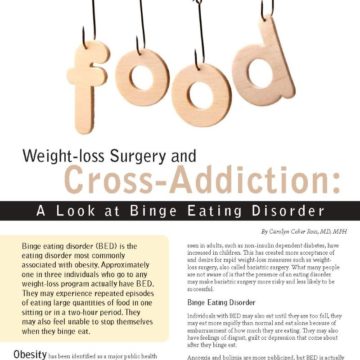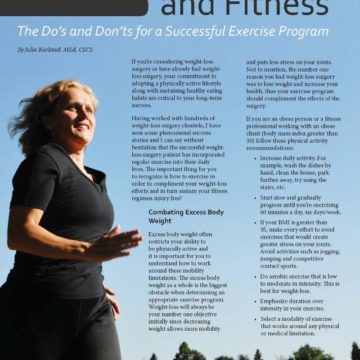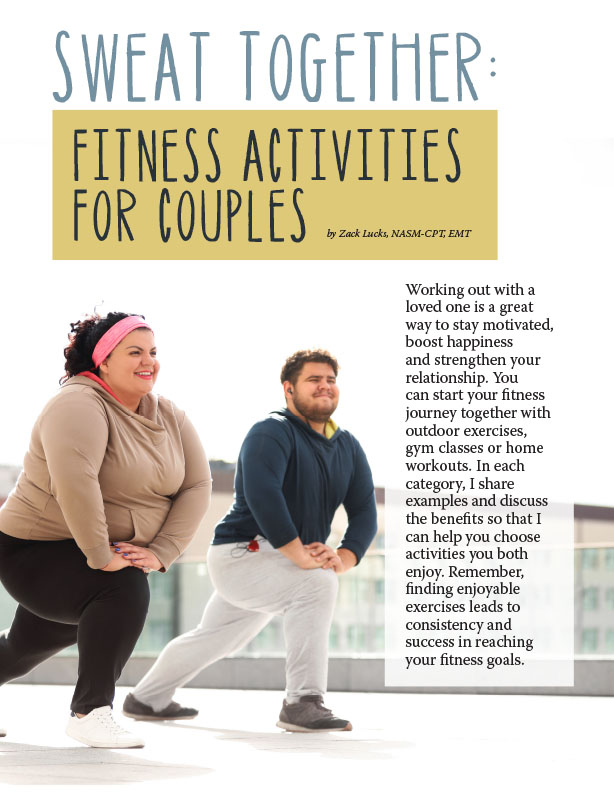Emergence of the "Bariathlete"

by Lea Crosetti, RD
Summer 2010
DISCLAIMER: To develop an exercise program that best suits your needs, please consult with your physician. It is important to talk with your doctor before beginning any exercise program.
Bariathlete:
People who have lost weight via bariatric surgery and are now competing in endurance events such as marathons, Ironmans, ultramans, Xterra races, centuries and much more. A new population is emerging, known as “bariathletes.” Because bariatric surgery provides access to moving more freely without weight-bearing pain, it allows people to act on the opportunities to make vital lifestyle changes. It’s like having a clean slate to work with (so to say).
Bariathletes get to choose to live into a life that may not have been possible without getting the weight off. Being thin isn’t necessarily the objective of the surgery; it is being healthy and active and taking care of our bodies, so we can have vitality and zest for life.
Most new post-ops can’t even begin to imagine running a marathon or competing in a triathlon right after surgery. Obviously, it takes time for anyone to train for such events and it all has to start somewhere. First and foremost, you need to participate in physical activities you truly enjoy. How are you suppose to do something life long if you hate it? You won’t do it. For many, exercise has become a form of punishment, whether it’s for eating a little extra or if the scale read slightly higher than the previous day.
Although exercise can be used to help manage our weight, weight-loss should not be the sole purpose of exercise. When people participate in activities they like, they are more inclined to continue with them and as a result improve their fitness levels and athletic abilities.
Having goals set up around fitness can help people stay motivated and enjoy a sense of accomplishment about reaching those goals. Racing or competing is not everyone’s passion, but people often want to contribute to others or support greater causes. Many bariathletes have chosen not to become competitive, but rather they take part in walks, such as the Susan G. Komen 3 Day Walk or the ASMBS Foundation and OAC’s Walk from Obesity, and raise money for organizations to fight cancer, diabetes, obesity, arthritis and other disease states, and that always feels good!
Bariathlete Nutrition
Sport-specific training occurs on a whole new level when advancing into the realm of competition. Choosing a race and working with a coach or trainer to design a program is highly recommended. Training requires sports specificity and periodized workouts to prevent injury and maximize performance. In addition, this transition poses a challenge when fueling a bariathlete’s new body.
Which guidelines should a bariathlete follow; bariatric or sports nutrition? The answer is neither. How can you “eat like an athlete” when you have a one ounce stomach? As you can see, running out of energy and dealing with gastrointestinal distress can be a major concern. This population who is competing in endurance events has an entirely different set of nutritional guidelines. For this group of athletes, it is highly recommended to work with a dietitian who specializes in bariathlete nutrition.
Using bariatric surgery as a tool to get the weight off can open up the doors to a whole new life. Creating a life full of adventures and participating in activities you love to do on a daily basis will be the key to long-term success. With the weight off, it allows for people to dream of possibilities they couldn’t even consider before. If those dreams or endeavors have you inspired to register for a race, then I recommend creating a support team of a coach and bariathlete dietitian. Remember to gradually build your endurance and strength as well as to vary your activities to establish your fitness foundation. Good luck, have fun and play!
About the Author:
Lea Crosetti, RD, is a triathlete, registered dietitian and the founder of BariAthletes and Food Coach For You. She received her bachelor’s degree in dietetics from the University of Hawaii at Manoa and is currently working on her master’s degree in exercise physiology at California State University Northridge. Combining her bariatric expertise with her sports nutrition background, Lea has an in depth understanding of how to fuel the body for endurance events after bariatric surgery.
by Yelena Kibasova Spring 2024 The fitness world is evolving, with new trends and innovations that promise…
Read Articleby Zack Lucks, NASM-CPT, EMT Winter 2024 Working out with a loved one is a great way…
Read Articleby Nina Crowley, PhD, RD (with Inspiration from Shawn Cochran) Winter 2024 Dating, no matter your age,…
Read Article









